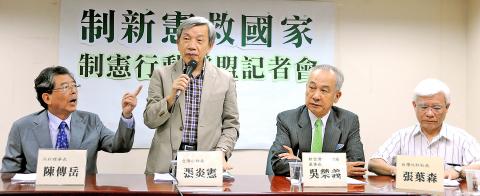Opposition parties and pro-independence groups yesterday called for the elimination of the Control Yuan and the Examination Yuan, with groups advocating the drafting of a new constitution to better fit the nation’s needs.
As lawmakers are set to review the qualification standards of the nominees for the two yuans this week and next week in the extra legislative session, the Democratic Progressive Party (DPP) and the Taiwan Solidarity Union (TSU) said the two institutions are better off being eliminated.
“The separation of the five powers system of the Republic of China [ROC] Constitution, as designed by founding father Sun Yat-sen (孫逸仙), has proven to be a failed system and it is time to adopt a system that separates the three powers, like in most Western democracies,” TSU caucus whip Lai Cheng-chang (賴振昌) told a press conference.

Photo: Liu Hsin-de, Taipei Times
The TSU caucus will boycott the review of nominees of the institutions, Lai said.
Seven of the 21 Examination Yuan candidates, including president nominee Wu Jin-lin (伍錦霖) and vice president nominee Kao Yuang-kuang (高永光), have either served as high-ranking Chinese Nationalist Party (KMT) officials, had close relations with the ruling party or worked for its think tank, DPP Legislator Tsai Chi-chang (蔡其昌) told a separate press conference.
“President Ma Ying-jeou (馬英九) has used nominations for the two institutions as his personal tool to hand out political rewards,” DPP Legislator Lee Chun-yi (李俊俋) said.
The People First Party also raised concerns with Ma’s nomination, with PFP Legislator Chen Yi-chieh (陳怡潔) saying that several Control Yuan member nominees were either “incompetent” former government officials, or politicians with close KMT ties.
“Is a Control Yuan [with such members] capable of being the government’s watchdog? It is questionable,” Chen said, adding that the Control Yuan’s right of investigation could be relegated to the Legislative Yuan.
Another press conference co-organized by pro-independence groups called for a new constitution tailor-made for Taiwan as Taiwan Society president Chang Yen-hsien (張炎憲) also favored a “three-powers” constitutional system.
With Ma’s pro-China policy and repeated infringement of the Constitution, Taiwanese would not be able to safeguard the country’s sovereignty without a new constitution, Chang said.
Drafted in China in the 1930s, the ROC Constitution does not now meet the contemporary needs of the nation’s political and economic development, despite having been amended seven times, said former vice premier Wu Rong-i (吳榮義), who is now president of the Taiwan Brain Trust think tank.

‘DENIAL DEFENSE’: The US would increase its military presence with uncrewed ships, and submarines, while boosting defense in the Indo-Pacific, a Pete Hegseth memo said The US is reorienting its military strategy to focus primarily on deterring a potential Chinese invasion of Taiwan, a memo signed by US Secretary of Defense Pete Hegseth showed. The memo also called on Taiwan to increase its defense spending. The document, known as the “Interim National Defense Strategic Guidance,” was distributed this month and detailed the national defense plans of US President Donald Trump’s administration, an article in the Washington Post said on Saturday. It outlines how the US can prepare for a potential war with China and defend itself from threats in the “near abroad,” including Greenland and the Panama

A wild live dugong was found in Taiwan for the first time in 88 years, after it was accidentally caught by a fisher’s net on Tuesday in Yilan County’s Fenniaolin (粉鳥林). This is the first sighting of the species in Taiwan since 1937, having already been considered “extinct” in the country and considered as “vulnerable” by the International Union for Conservation of Nature. A fisher surnamed Chen (陳) went to Fenniaolin to collect the fish in his netting, but instead caught a 3m long, 500kg dugong. The fisher released the animal back into the wild, not realizing it was an endangered species at

The Chinese Nationalist Party (KMT) is maintaining close ties with Beijing, the Democratic Progressive Party (DPP) said yesterday, hours after a new round of Chinese military drills in the Taiwan Strait began. Political parties in a democracy have a responsibility to be loyal to the nation and defend its sovereignty, DPP spokesman Justin Wu (吳崢) told a news conference in Taipei. His comments came hours after Beijing announced via Chinese state media that the Chinese People’s Liberation Army’s Eastern Theater Command was holding large-scale drills simulating a multi-pronged attack on Taiwan. Contrary to the KMT’s claims that it is staunchly anti-communist, KMT Deputy

The High Prosecutors’ Office yesterday withdrew an appeal against the acquittal of a former bank manager 22 years after his death, marking Taiwan’s first instance of prosecutors rendering posthumous justice to a wrongfully convicted defendant. Chu Ching-en (諸慶恩) — formerly a manager at the Taipei branch of BNP Paribas — was in 1999 accused by Weng Mao-chung (翁茂鍾), then-president of Chia Her Industrial Co, of forging a request for a fixed deposit of US$10 million by I-Hwa Industrial Co, a subsidiary of Chia Her, which was used as collateral. Chu was ruled not guilty in the first trial, but was found guilty